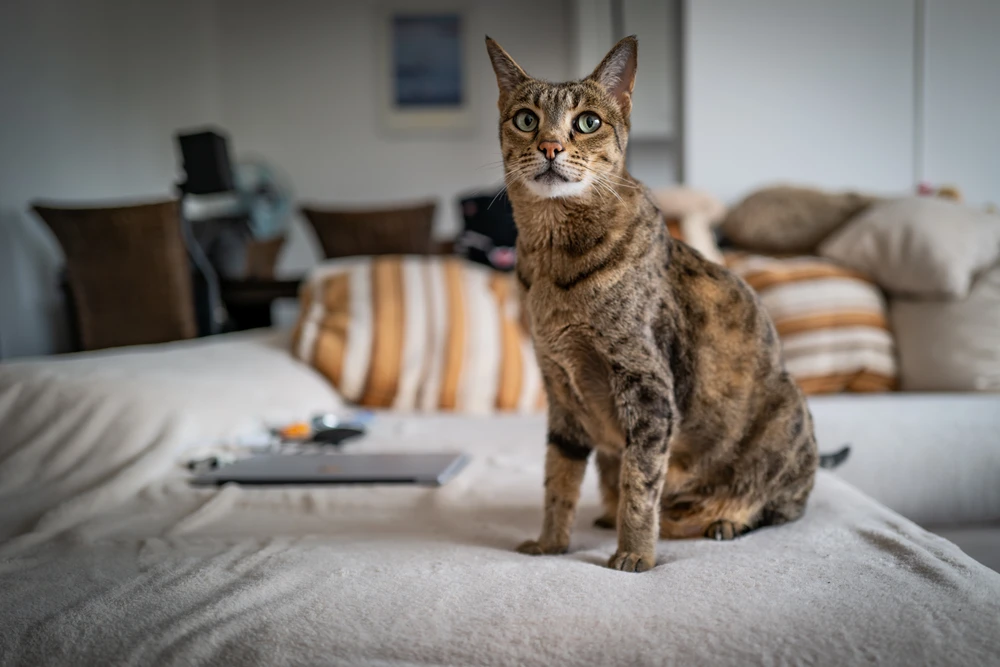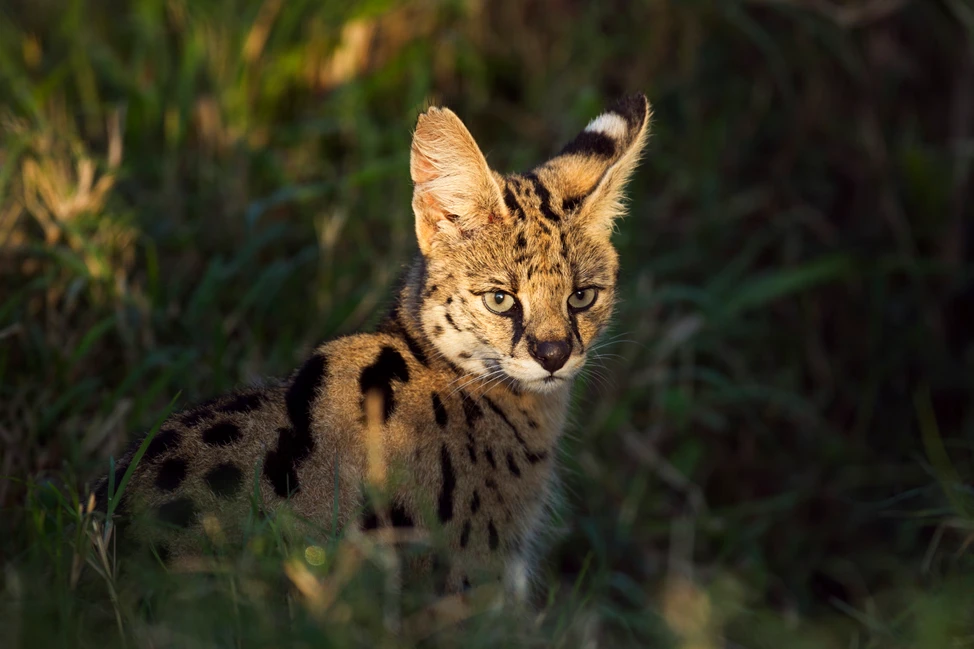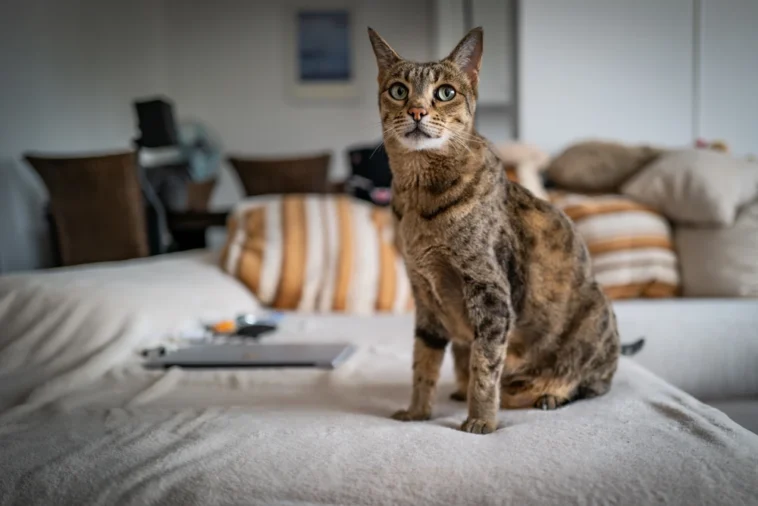The Savannah cat is a relatively new breed of feline that has taken the world by storm. These majestic creatures are a hybrid of the African Serval and a domestic cat, resulting in a cat that looks like a miniature cheetah.
Savannah cats are known for their athleticism, agility, and striking appearance. They are also highly intelligent, making them great pets for those who are looking for a feline companion that can keep up with their active lifestyle.
In this article, we’ll take a closer look at the Savannah cat, exploring its history, physical characteristics, temperament, and care.
Savannah Cat: History
The Savannah cat breed was first developed in the 1980s by a breeder named Judee Frank. Frank was interested in creating a new breed of feline that would have the exotic appearance of the African Serval but with the domestic temperament of a cat.
After several years of breeding, Frank successfully developed the first Savannah cat in 1986. Since then, the breed has continued to gain popularity and recognition, and is now recognized by many cat associations around the world.
Savannah Cat: Physical Characteristics
Savannah cats are striking creatures that are easily recognized by their distinctive appearance. They are tall and lean, with long legs and a long neck. Their heads are small and triangular, with large, round ears that sit on top.

One of the most striking physical features of the Savannah cat is their coat. Their coat is short and smooth, with a distinctive pattern that is reminiscent of a cheetah. The coat can come in a variety of colors, including brown, silver, black, and white.
Savannah Cat: Temperament
Savannah cats are highly intelligent and curious animals that are known for their playful and energetic personalities. They are very social animals and enjoy interacting with their owners and other pets.
Despite their wild appearance, Savannah cats are generally well-behaved and can make excellent pets for families with children. They are also known for their loyalty and affectionate nature, often following their owners around like a dog.
Savannah Cat: Health Problems
Like all breeds of cats, Savannah cats can be prone to certain health problems. Here are some of the health issues that Savannah cats may be more susceptible to:
Hypertrophic Cardiomyopathy (HCM): This is a common genetic heart condition that affects many cats, including Savannah cats. HCM is a thickening of the heart muscle, which can cause heart failure or sudden death. Regular cardiac screenings are recommended for Savannah cats to detect HCM early and manage it appropriately.
Dental Problems: Dental issues such as periodontal disease, gingivitis, and tooth decay can affect Savannah cats, especially as they age. Regular dental checkups and cleanings can help prevent these problems.

Feline Lower Urinary Tract Disease (FLUTD): This is a common condition that affects the urinary tract of cats, causing painful urination, blood in the urine, and difficulty urinating. This condition can be caused by several factors, including stress, diet, and obesity.
Patellar Luxation: This is a condition in which the kneecap dislocates from its normal position, causing lameness and pain. Savannah cats can be prone to this condition due to their long legs and lean body type.
Progressive Retinal Atrophy (PRA): This is a genetic condition that affects the eyes of cats, causing gradual vision loss that can eventually lead to blindness. Regular eye exams can help detect PRA early and manage it appropriately.
It’s important to note that not all Savannah cats will develop these health problems, and many can live long and healthy lives with proper care and preventative measures. Regular checkups with a veterinarian and providing a balanced diet and exercise can help keep your Savannah cat healthy and happy.
Savannah Cat: Care
Savannah cats require a little extra care compared to traditional domestic cats. They need plenty of exercise and mental stimulation to keep them happy and healthy. This can include providing them with toys to play with, taking them for walks on a leash, and engaging them in training exercises.
Savannah cats are also prone to certain health issues, including heart disease and dental problems. As such, it’s important to take them to the vet regularly for check-ups and preventative care.
FAQs
What is a Savannah Cat?
A Savannah Cat is a domestic cat breed that is a cross between a domestic cat and a servile, which is a wild African cat. They are known for their distinctive appearance, which resembles a small wildcat, with long legs, large ears, and spotted coats.
Are Savannah Cats legal to own as pets?
The legality of owning a Savannah Cat as a pet varies by jurisdiction and country. In some places, they may be considered exotic or wild animals and may have restrictions or require permits or licenses. It’s important to check the laws and regulations in your specific area before considering owning a Savannah Cat as a pet.
What is the temperament of a Savannah Cat?
Savannah Cats are known for their energetic, playful, and inquisitive personalities. They are often described as being highly intelligent, curious, and social. However, their behavior can vary depending on their individual traits and their upbringing.
How big do Savannah Cats get?
Savannah Cats can vary in size depending on the generation and the specific genetics of the individual cat. Generally, Savannah Cats can range in size from about 8 to 20 pounds, with some larger males reaching up to 25 pounds or more.
What is the care and maintenance required for Savannah Cats?
Savannah Cats require similar care to other domestic cats, including regular grooming, vaccinations, and veterinary care. They also need regular exercise and mental stimulation to keep them healthy and happy. Additionally, as hybrid cats, they may have specific dietary and environmental requirements, so it’s important to research and understand their unique needs.
Can Savannah Cats be kept indoors?
Yes, Savannah Cats can be kept as indoor pets. In fact, many experts recommend keeping them indoors to protect them from potential dangers such as predators, diseases, and accidents. However, they also need opportunities for exercise, play, and mental stimulation indoors, such as providing them with scratching posts, toys, and climbing structures.
Are Savannah Cats good with children and other pets?
Savannah Cats can be good with children and other pets, but their temperament and behavior can vary depending on their individual personality and socialization. Early and proper socialization is important to ensure they develop good behavior and positive interactions with children and other pets.
Do Savannah Cats require any special training?
Savannah Cats, like all cats, can benefit from basic training and socialization. However, due to their wild ancestry, they may have certain behaviors that are more challenging to manage, such as jumping, climbing, and hunting instincts. Patient and consistent training techniques, positive reinforcement, and early socialization can help in managing their behavior.
Are Savannah Cats hypoallergenic?
Savannah Cats are not considered hypoallergenic, as they still produce allergens like other cats. However, some individuals with allergies may find that they are less sensitive to Savannah Cats compared to other cat breeds, as their coat is shorter and they produce less dander.
Where can I find a reputable Savannah Cat breeder?
It’s important to do thorough research and find a reputable breeder if you are interested in getting a Savannah Cat. Look for breeders who are registered with reputable cat associations, follow ethical breeding practices, provide proper care and socialization for their cats, and are transparent about their breeding practices and the health of their cats.

